Net Worth Update June 2016 – Sean Cooper (+2.76%)
Welcome to the Million Dollar Journey June 2016 Net Worth Update – Team MDJ edition. A select group of readers were selected to be part of Team MDJ which was conceived after the million dollar net worth milestone was achieved in June 2014. Sean Cooper was selected as a team member and will post net worth updates on a regular basis. Here is more about Sean.
Profile:
- Name: Sean Cooper
- Age: 30
- Net Worth: $756,734
- Day Job: Employed with a major global pension consulting firm.
- Family Income: $58,050 (full-time job), $18,600 (rental income before expenses), $40,000 (approximate freelance income)
- Goals:
Mortgage paid off by 31, million dollar net worth by mid thirties. - Notes: Owns a house, rents out main floor. Most of net worth is in the principal residence. Paid off my mortgage in three years by age 30.
When I imagined being mortgage-free, I never thought it’d be so hectic. I’ve been busier than ever these last three months finishing my book. I’m happy to say I’ve made a lot of progress. The official title is “Burn Your Mortgage: A Simple, Powerful Path to Financial Freedom.” My book is to aspire those young and old to own a mortgage-free home. In my book, I offer practical advice on how anyone can pay off their mortgage and enjoy financial freedom sooner. I’ve really enjoyed writing a book. Writing a book seems to be on everyone’s bucket list. I’m happy to say it will be crossed off mine soon. The manuscript is written. I’m currently working on the editing phase. I’ll keep you posted!
Once my book is released, I’m not just going to post it on Amazon and hope for the book sales to role in. I have a multi-pronged marketing plan to get the word on the street. One of the ways I’m promoting my book is by speaking at colleges, universities, conferences and events. Speaking in front of a large audience can be frightening. To make sure I’m well spoken, I’ve joined Toastmasters. Jonathan Chevreau recommended it to me a while ago. Since joining Toastmasters, my public speaking abilities have improved by leaps and bounds. I’m already on my third speech. I’m no longer nervous to speak in front of an audience. I highly recommend joining Toastmasters, especially if you’re looking to boost your self-confidence.
After being a bit of spendthrift (at least by my standards), I’ve gone back to my frugal ways. I still live in the basement and rent out the upstairs, cycle to work and pack my own lunch – and I wouldn’t have it any other way. I haven’t been saving as much, but that’s because I’m self-publishing my book. You have to spend money to make money, as the saying goes. Although I’ll be busy with my book for the next year, I’m still trying to decide what to do with the rest of my life. I’m a big fan of Dragon’s Den and Shark Tank. I’d like to eventually get involved with a Fintech startup or start my own. Opportunities come up when you least expect them.
One of my favourite parts of being a personal finance expert is helping others out. I’ve written hundreds of articles over the last five years on personal finance. While writing articles is great, I’ve always wanted to help people on a one-on-one basis with their finances. That’s why I’m proud to say I’m now offering money coaching and financial planning. Whether you’d like to follow in my footsteps and burn your mortgage or you’d like help with paying off consumer debt, I’m looking forward to helping you transform your finances and make you rethink the way you view money.
Big news! I’ve finally decided on my first trip. I’ll be travelling to San Diego in September for FinCon. I’m super excited about the event. It will be great to connect with fellow bloggers and media personalities. I’m looking forward to learning from the brightest minds in the world of personal finance, as well as making connections and learning about new ways to market my book. This will by my first big trip in forever, so hopefully there’s some time to hit the beach and catch some rays. Readers, where should I travel to for my next trip?
I paid off my mortgage in September 2015 and I’m being bombarded with media request. I recently had the honour and privilege of doing a video interview with the President and CEO of Tangerine, Peter Aceto on how I paid off my mortgage by age 30. I’m no stranger to controversy. I wrote a blog post that has everyone talking on Why Millennials Should Save Their Down Payment and Not Rely on the Bank of Mom and Dad. Readers, do you think 20-something years should expect help from their parents with their down payment or should they save it themselves?
On to the net worth numbers:
Assets: $756,734 (+2.76%)
- Cash: $41,545 (+69.57%)
- Registered/Retirement Investment Accounts (RRSP): $65,429 (+0.22%)
- Tax Free Savings Accounts (TFSA): $13,552 (+23.10%)
- Defined Benefit Pension: $35,266 (+0.00%) (commuted value adjusted annually in June when I receive my annual statement)
- Non-Registered Investment Accounts: $943 (+190.90%)
- Principal Residence: $600,000 (+0.00%) (purchase price adjusted for average selling price annually)
Liabilities: $0 (0.00%)
- Principal Residence Mortgage: $0 (0.00%)
Total Net Worth: ~$756,734 (+2.76%)
- Started 2016 with Net Worth: $736,382
- Year to Date Gain/Loss: +2.76%
Some quick notes and explanations to common questions:
The Cash
The cash is held in a no fee chequing account with PC Financial. I use my chequing account for regular bill payments, as well as making lump sum payments on my mortgage.
Savings
My savings are held in a savings account with Canadian Direct Financial. I mainly use my savings account as an emergency fund and to save towards the balance owing when I file my personal income tax return at the end of April. Even though I contribute the maximum to my RRSP annually, I still have a large balance owing to the taxman since I receive rental income and income from self-employment (I’m a freelance writer).
Where Do the Savings Come From?
I’m very frugal with my money. People are often amazed at how low my monthly expenses are. For most families the most costly household expenses are housing (mortgage or rent), transportation, and food. I’ve been able to minimize all three through lifestyle choices.
As a single first-time home buyer in Toronto, I decided to take on the added responsibility of being a landlord. Instead of living upstairs, I decided to live in the basement and rent the upstairs to a family. I got this brilliant idea from the host of HGTV’s Income Property, Scott McGillivray, who lived in his basement for nine years while renting out the upstairs unit to save money.
Instead of driving a car, I cycle the majority of the year and take public transit during wintertime. In my recent article in the Financial Post readers were amazed I only spend $100 per month on groceries. How have I managed to spend so little? I shop at discount supermarkets, price match, avoid fast food, and buy sale items in bulk. I’m also vegetarian, which helps me avoid paying the outrageous prices for meat.
How Have I Been Able to Pay Down My Mortgage So Quickly?
Despite an annual salary of only $50,000, I’ve been able to pay down over half of my mortgage in only two years through hard work and determination. Besides being a landlord, I’m a financial journalist. I also work part-time at a grocery store once a week. Through secondary sources of income, I’ve been able to maximize the prepayment privileges on my mortgage and maximize my RRSP contributions each year.
Update May 2015 – I’ve revised my freelance income up to $40,000 from $20,000 to better reflect how much I earn. I’ve received a few questions about how I’ve been able to pay down my mortgage so quickly. It’s mainly been through my freelance income. I tend to be conservative with my estimate of freelance income, as it can vary a lot from month to month. For example, some months I earn $2,000, while others I earn $5,000+. For 2014, I ended up earning over $60,000 in freelance income. Earnings that much in freelance income requires working 80 hours or more a week (including my full-time job). I don’t plan to keep this insane workload up forever. Once my mortgage is paid off at the end of 2015, I plan to scale back and only focus on the freelance work that I enjoy.
Real Estate
My real estate holdings consist of my primary residence. I purchased my house in November 2012 for $425,000 with a mortgage of $255,000. As I live in Toronto, one of Canada’s most expensive housing markets, I’ve based the value of my principal residence on comparable properties that have recently sold in my neighbourhood.
Pension
The pension amount listed above is the value of my defined benefit pension plan. I take the commuted value from my annual statement, which I receive by June 30th each year. I am fortunate to receive the commuted value on my annual statement, as most employers don’t provide it. This makes retirement planning a lot easier.
I've Completed My Million Dollar Journey. Let Me Guide You Through Yours!
Sign up below to get a copy of our free eBook: Can I Retire Yet?


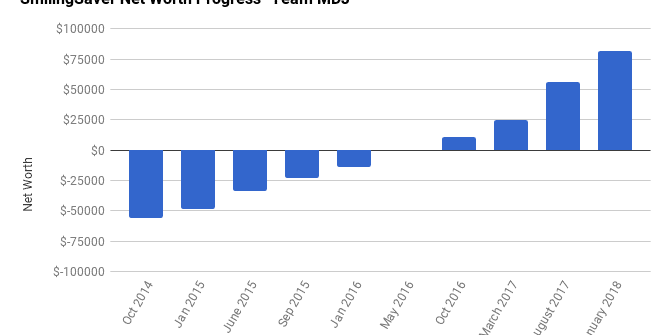
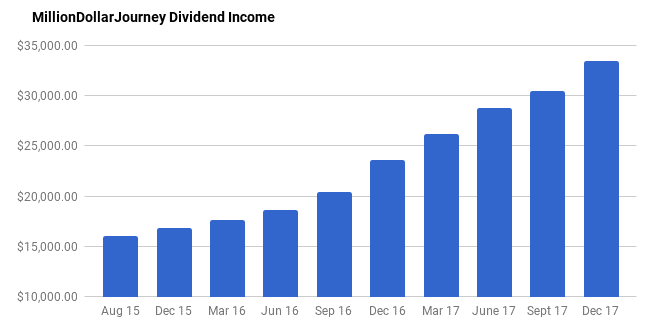
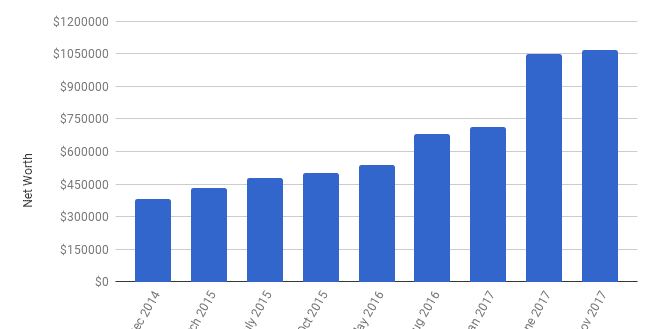
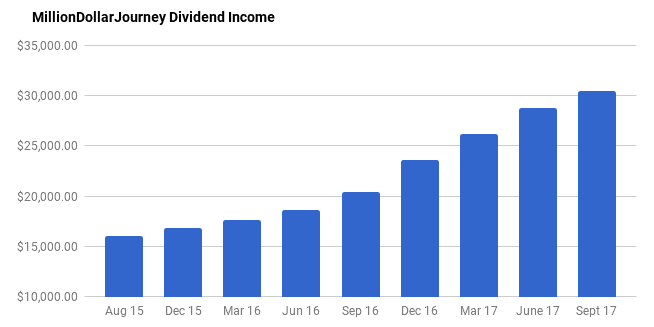


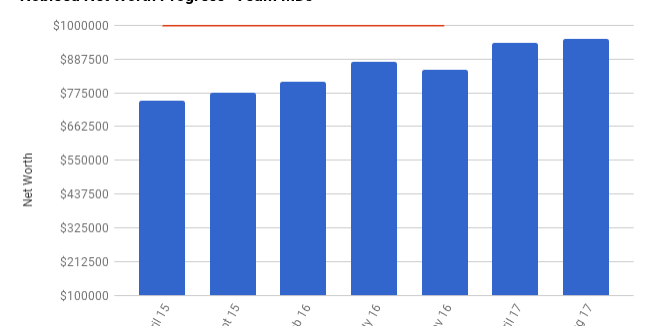

I think that if MDJ is going to continue to post Sean Cooper updates (or if we’re going to return to this site), we do need to see at least a rough breakdown of how that mortgage was paid down.
e.g.
Initial Principle
Principle at year 1
Principle at year 2
etc
Thank you for the comments everyone. I was able to pay down my mortgage so quickly by doubling my income by freelancing and reducing my expenses to a minimum. I don’t own a car. I only spend $100 per month on groceries since I’m a vegetarian. I didn’t travel or do anything fancy. I did pay my fair share of taxes. I contributed to the maximum to my RRSP to lessen my tax liability. I was able to earn almost $100K a year from my full-time job, freelancing and my part-time job.
Sean, your explanation doesn’t make much sense.
To repay a $255K mortgage in 35 months, you’re paying nearly $7,300 per month just on the principle. That requires take-home income of nearly $88K per year.
You just said that you earned “almost $100K a year”. In Ontario, $100K of income will give you approximately $73K in take-home pay.
In other words, the amount of income that you just told us is insufficient to cover your mortgage principle payments. Once you take into account other expenses (the $25K repair bill you talked about in August 2014, property taxes, home insurance, groceries, etc) that difference is even larger.
It’s mathematically impossible for you to pay your income so quickly based on the income you provided – before we account for any other expenses!
Assuming that Sean actually repaid a $255K mortgage in three years, I see only two possibilities. One is he’s significantly under-stating his income (his numbers would be plausible if his gross income was around $150K per year). The other is he has another source of funds (inheritance, lottery, sale of baseball cards collection, etc) that he hasn’t disclosed.
With all due respect, of course it makes no sense. Anyone with a calculator and some grade school math skills can figure that out. But by telling the lie it helps him sell his articles and “financial advice” (see his web site). I don’t know who is paying for financial advice from a back office call center rep – but whatever floats your boat. I too wish that I could make 2+2=5. Maybe Sean can provide some “financial advice” pro bono to help me. Here’s my problem:
I have a $255k mortgage and $25k of house repairs that I want to pay off in 3 years. I make $100k per year. That looks like about $75k after tax in Ontario. http://www.ey.com/CA/en/Services/Tax/Tax-Calculators-2016-Personal-Tax
$75k x 3 years is only $225k. That leaves me $55k short and I haven’t eaten or paid a single bill. I’m a vegetarian so I mostly eat moss that grows in my backyard. But insurance, utilities, etc. are real costs I can’t avoid. Maybe I can contribute “…the maximum to my RRSP to lessen my tax liability”? [Hint: This will actually REDUCE the cash available to pay off your mortgage]. I want to write a book in 3 years time about how I paid off my mortgage. Can someone please help me with this?
He did rent out the upper part of the house while living in the basement. That would help bring the cash, but not sure how much. Does anyone know what it would rent for and if that makes the numbers work?
I re-read Sean’s comment and I think he means he earned almost $100K only from his job and freelance work. Fair enough. Per the article, he says he earns $18,600 in rental income before expenses. Let’s be generous and assume he pays no tax on that income (due to deductions). That gives him an extra $54K over 35 months.
Steve calculated that his shortfall is $55k. (In my post above his, I calculated a shortfall of $15K per year or $44K over the period, but that was based on a ballpark estimate of after-tax income – let’s use Steve’s number since he provided a link to a reputable source to calculate taxes).
The shortfall is $55K. We now have an extra $54K of after-tax income – so Sean is still $1K short, and still has to pay for three years’ worth of interest on the mortgage, property taxes, utilities, home insurance, groceries, transportation, clothes, and everything else.
Toronto charges property tax at a rate of just over 0.7% annually for residential homes. He bought his house for $425K (but says it’s now worth $600K). Once again, to be charitable, let’s assume the assessed value is $425K. The total property taxes would be just over $9K over the three years (so the shortfall is now $10K). A quick calculation of mortgage interest in Excel suggests that over three years it works out to about $8K (assuming he pays down the mortgage evenly each month with a low 2.0% rate). Let’s assume utilities are $6K over the three year period, insurance is $3K, groceries are $3K, and he has another $3K for everything else (clothes, public transit, entertainment, etc).
That still gives Sean a shortfall of $33K over the three years. This is based on a number of generation assumptions such as 1) he lives like a pauper and spends virtually nothing on entertainment or travel 2) he pays no tax on his rental income and 3) property taxes, his next biggest expense, is assessed based on the historical cost of his home, rather than market value.
These are estimates of course. I might be off by a few thousand dollars in either direction. But it seems highly unlikely that I’ve overstated his expenses by $33K. The numbers – still – aren’t remotely plausible.
In summary – even taking into account the rental income, and making a number of generous assumptions, Sean still has a large, unexplained shortfall. As I said before, I suspect Sean either has an undisclosed source of assistance, or his income is substantially higher than he claims (they start becoming plausible, in my opinion, if he earns about $150K each year).
I’m glad I am not alone when it comes to the mystery of how Sean Cooper actually paid off his mortgage. I wrote a similar breakdown of the numbers on the CBC’s message board when this story first came out and how it didn’t add up. Of course my post was disliked and hated by most but at the end of the day I believe he didn’t pay tax on his freelance income and had parental assistance on that $200k+ down payment. Just another BS story to make good headlines. As other said…I’m sure he’s a nice guy and is as cheap as they get, but you still have pay taxes. I hope CRA is paying attention.
I think its imperative to make your kids save their own downpayment. If the house was too expensive for them to buy upfront, then it might be too expensive to own and upkeep as well. They can learn the value of frugality while building up their savings for a house. Also, that’s what the FHA is for to make homebuying accessible to first time buyers
You’ll notice that Cooper no longer responds to comments regarding his net worth updates — August 2015 was his last — so perhaps we should all stop commenting and let a natural withering occur.
SST, the activty and feedback within the entire site has declined since almost 2 years now. The same pattern occurs through many personal finance blogs theese days. Don’t know why: 1-Most (enough?) have bee said, 2- Revenues are so HUGE (profits with no efforts), 3-General interest is declining (since markets are not sky-rocketing anymore), 4-Other reasons?
Forgive my ignorance, but how did you transform your HELOC and what does reimburse cap + int mean?
I agree that having diversification is important. We started using our HELOC last year to invest. Just out of curiosity what are people able to obtain for rates? We have prime + 0.5%.
@ Joseph Thompson, my HELOC is prime + 0.5% but I transformed a segment at prime -0.65% last november and reimburse cap + int.
Forgive my ignorance, but did you transform your HELOC and what does reimburse cap + int mean?
At RBC, you can “split” your HELOC in as much as 5 differents segments. Each of them can be converted as a mortgage with a repayment schedual and low variable or fixed rate. The monthly payment is automaticaly paid from a seperate checking account and then, I “manualy” transfer the exact same amount back into the checking account from the HELOC. At the end, my total capital stays the same, interests are “capitalized” and my cashflow is untouched. Track record is clear is I got an audit from CRA.
I see, are you actually paying down the mortgage segment, or interest only? I’m assuming interest only, and then you keep renewing the mortgage?
Joseph, I actualy pay the mortgage segment principal + interest but use another segment through a separate checking account. My personal cashflow is not involved in the process. At the end, my mortgage principal stays the same and interest are compounded (capitalized)
I agree that the numbers look suspect if the mortgage was only repaid through wages. It would be beneficial for readers to show a payment schedule or explain where the extra money came from. I have no issue if part of the mortgage was repaid through an inheritance or selling off of other assets like a big stamp collection or sale of a car or even through capital gains made in the stock market. But it needs to be made clear. I feel that by not shedding light on the matter makes it look like the numbers were made up just so that an article could be produced.
Huge congrats Sean. You are doing amazingly well. Paying off of that mortgage is great and the house was reasonably priced in 2012 as well. I am sure you will beat all the goals that you have set up going forward. My goal is to reach $200K net worth in 2016 and I am getting really close to it! Congrats to both of us! :)
Le Barbu, that is a fine portfolio you got there! I’m with you on debt. Debt used to build assets is often considered smart. And at today’s low interest rates, you can often use that extra leverage to build assets faster. There’s a caveat though: you have to have some knowledge and comfort level when doing this, because there is definitely more risk as well. People often worry about what if interest rates increase. In my opinion, because people in this country (the government included!) are so up to their eyeballs in debt, any rate increase will be limited to something like 0.25 %. I actually have a rental property with a mortgage. I’ve made aggressive extra payments in the past, but because the interest can be written off against rental income, I don’t see any rush to pay this down anytime soon. Money used to pay down this mortgage would likely be better invested elsewhere.
Alpha Centauri, it’s very important is to keep debt level under control (in my own case, in the 20-30% range), the repayment schedual is long enough (25-30 years) and interests are tax deductible (38% for me because of my income bracket). Surprisingly enough, if the interest rates hikes, the write off will increase the advantage of doing it. Usually, rates dont increase alone. They are linked whith inflation and prosperity wich are both driven (or drive, depends) general economy and stock market. If investments are tax advantaged (especially compared to the interest rate dedution) the margin (net profit) INCREASE.
Another consideration, you better borrow when you are in a situation you can do it. I know some elders whith low income who just cant get a loan or the interest rate is in the 8-12% range. Thats another reason to build a big nest egg and cashflow before it’s to late.
Hope Sean will feed us with some of his thougths
I have a fairly substantial real estate portfolio and one of the reasons I paid down the debt quickly was to access the equity via HELOCs at prime. I now have 2.2 mil to invest at my discretion without having to jump through the hoops of commercial lending including the higher fees and rates. Plus, any application at this level is over a hundred pages according to my banker.